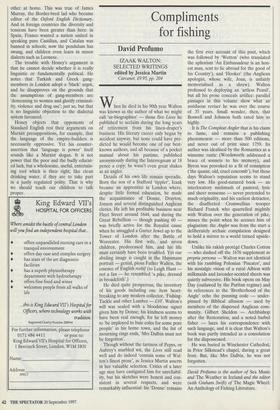Compliments for fishing
David Profumo
IZAAK WALTON: SELECTED WRITINGS edited by Jessica Martin Carcanet, f9.95, pp. 204 When he died in his 90th year Walton was known as the author of what we might call 'ur-biographies' — those five Lives he published to acclaim during the long years of retirement from his linen-draper's business. His literary career only began by accident anyway, but none could have pre- dicted he would become one of our best- known authors, and all because of a pocket manual about his pastime, published anonymously during the Interregnum at 18 pence a copy; he wasn't even great shakes as an angler.
Details of his own life remain sporadic. Born the son of a Stafford 'tippler', Izaak became an apprentice in London where, despite little formal education, he made the acquaintance of Donne, Drayton, Jonson and several distinguished Anglican clerics. He left his profitable business near Fleet Street around 1644, and during the Great Rebellion — though pushing 60 was briefly active for the Royalist cause when he smuggled a Garter Jewel up to the Tower of London after the Battle of Worcester. His first wife, and seven children, predeceased him, and his life must certainly have been troubled. Yet our abiding image is caught in the Huysmans portrait — genial, pious Father Walton, the essence of English rosbif (to Leigh Hunt not a fan — he resembled 'a pike, dressed in broadcloth'.) He died quite prosperous, the inventory of his goods including one item heart- breaking to any modern collector, 'Fishing- Tackle and other Lumber — £10'. Walton's will was sealed with a bloodstone signet given him by Donne; his kindness seems to have been real enough, for he left money to 'be imployed to buie coles for some pore people' in his home town, and the list of mourning rings ends, 'Mrs Dalbin must not be forgotton'.
Though without the tartness of Pepys, or Aubrey's marbled wit, the Lives still read well and do indeed 'contain some of Wal- ton's finest prose', as Jessica Martin asserts in her valuable selection. Critics of a later age may have castigated him for unreliabil- ity, but his sketches were honest and con- sistent in several respects, and were remarkably influential: his 'Donne' remains the first ever account of this poet, which was followed by 'Wotton' (who translated the aphorism 'An Embassadour is an hon- est man, sent to lie abroad for the good of his Country'), and 'Hooker' (the Anglican apologist, whose wife, Joan, is unfairly memorialised as a shrew). Walton professed to deploying an 'artless Pensil', but all his prose conceals artifice: parallel passages in this volume show what an assiduous reviser he was over the course of 35 years. Small wonder, then, that Boswell and Johnson both rated him so highly.
It is The Compleat Angler that is his claim to fame, and remains a publishing phenomenon — more than 500 editions, and never out of print since 1759. Its author was idealised by the Romantics as a winsome rustic (Wordsworth addressed a brace of sonnets to his memory), and Byron was provoked to a fit of conniption (`the quaint, old, cruel coxcomb'), but these days Walton's reputation seems to stand very low. His good-natured book — an interlocutory mishmash of pastoral, lyric and sheer nonsense — never pretended to much originality, and his earliest detractor, the disaffected Cromwellian trooper Richard Franck who quarrelled mightily with Walton over the generation of pike, misses the point when he accuses him of plagiarism: the Angler was from the start a deliberately archaic compilation designed to hold a mirror to a world turned upside- down.
Unlike his rakish protégé Charles Cotton — who dashed off the 1676 supplement in propria persona — Walton was not identical with his rambling Polonian `Piscator', and his nostalgic vision of a rural Albion with milkmaids and lavender-scented sheets was quietly subversive. His book opens on May Day (outlawed by the Puritan regime) and its references to the 'Brotherhood of the Angle' echo the punning code — under- pinned by Biblical allusion — used by members of the dispersed Anglican com- munity. Gilbert Sheldon — Archbishop after the Restoration, and a noted barbel fisher — laces his correspondence with such language, and it is clear that Walton's book was partly intended as a consolation for the dispossessed.
He was buried in Winchester Cathedral, in Prior Silkstead's chapel, during a great frost. But, like Mrs Dalbin, he was not forgotten.
David Profumo is the author of Sea Music and The Weather in Iceland and the editor (with Graham Swift) of The Magic Wheel: An Anthology of Fishing Literature.


































































 Previous page
Previous page